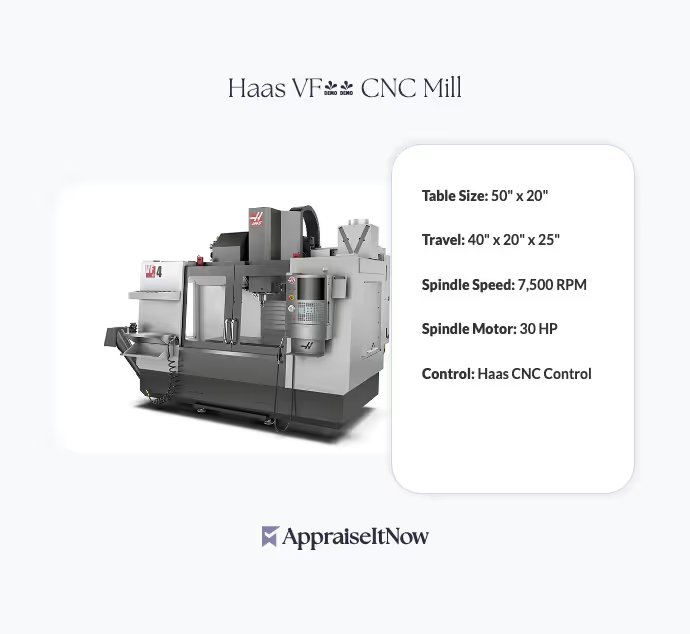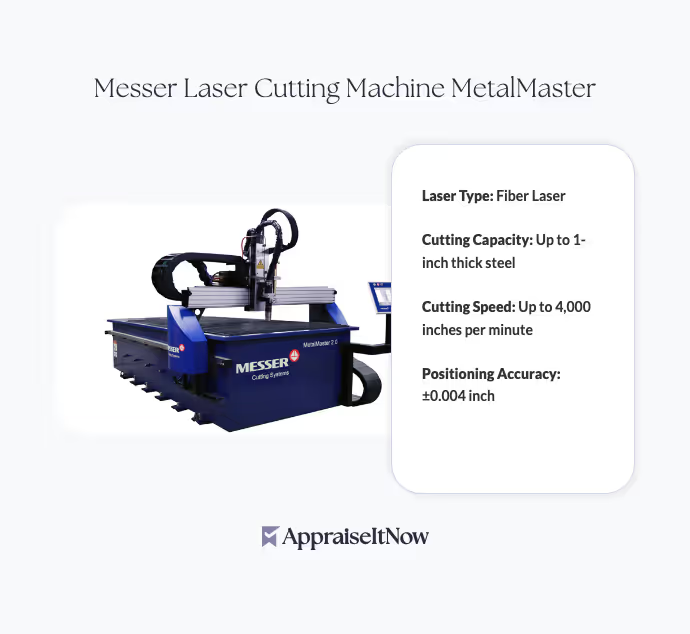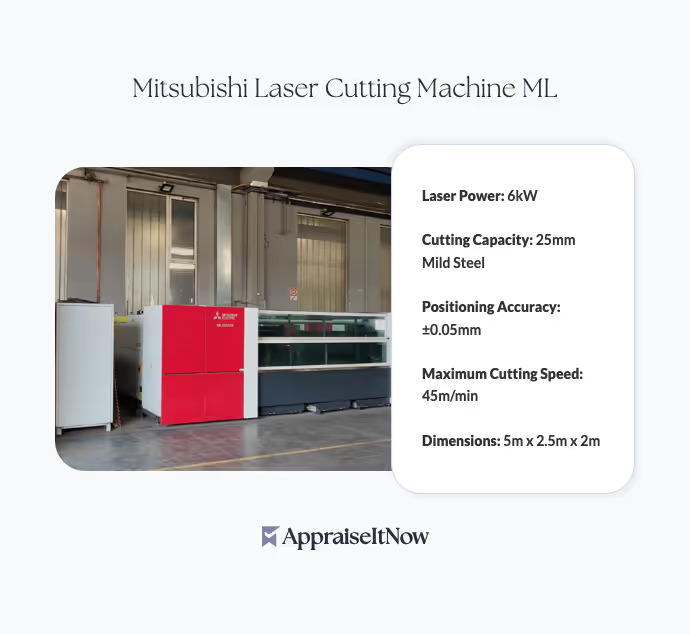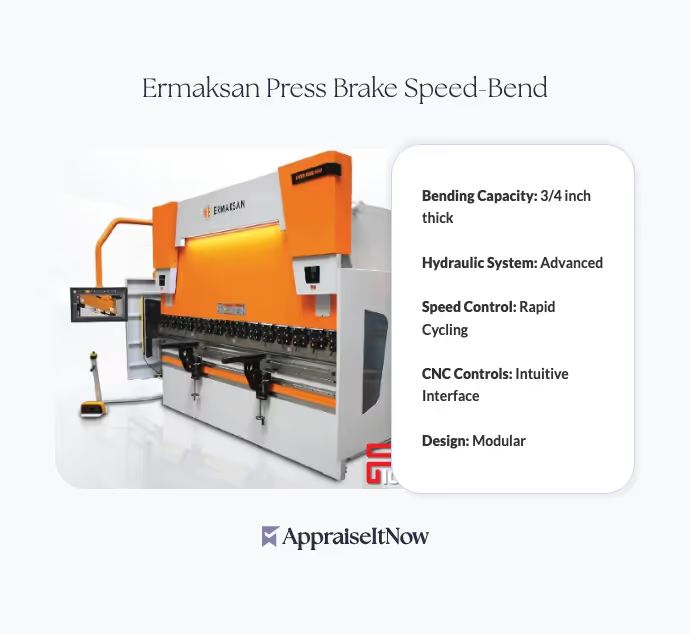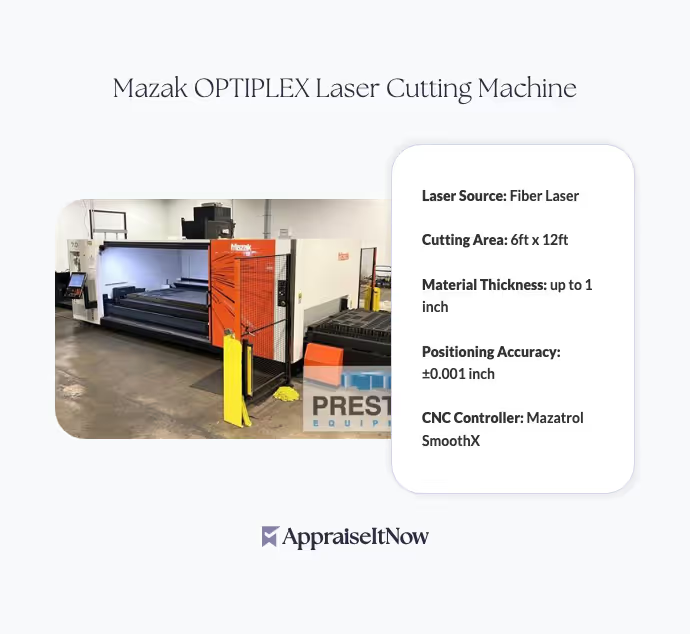<h1>How to Get Your Haas VF-4 CNC Mill Appraised</h1>
<p>The <strong>Haas VF-4 CNC Mill</strong> has established itself as one of the most reliable and versatile machining centers in modern manufacturing. Whether you're acquiring one for your shop, selling existing equipment, or need documentation for insurance and financing purposes, understanding the appraisal process ensures you capture an accurate valuation. Current market estimates place the VF-4 between <strong>$75,000 and $90,000</strong>, though condition, age, and configuration significantly influence the final appraised value.</p>
<h2>Why the Haas VF-4 Commands Premium Value</h2>
<p>Since its introduction in <strong>1996</strong>, the Haas VF-4 has become the benchmark for mid-size CNC mills across job shops, production facilities, and manufacturing operations worldwide. The machine's <strong>40" x 20" x 25" travel</strong> specifications, combined with a powerful <strong>7,500 RPM spindle</strong> and <strong>30 HP motor</strong>, create a sweet spot between precision and production capability that continues to drive demand even in today's market.</p>
<p>The VF-4's reputation for reliability answers the common question about CNC machine longevity—what is the lifespan of a Haas CNC? With proper maintenance, these machines routinely deliver 15-20+ years of consistent performance, making them sound investments for job shops and manufacturers. This proven track record directly supports the machine's resale value and justifies the investment when evaluating <a href="/types/equipment-and-machinery">equipment and machinery appraisals</a>.</p>
<div class="callout tip"><p><strong>Market Insight</strong></p>
<p>Well-maintained Haas VF-4 units with documented service records typically maintain 65-75% of their original purchase price, making them stronger investments than many industrial assets.</p></div>
<h2>Key Technical Specifications Affecting Appraisal Value</h2>
<p>When evaluating a Haas VF-4 for appraisal purposes, understanding which specifications impact value helps you prepare for the assessment process. The machine's <strong>rigid cast-iron construction</strong> provides the foundation for its precision capabilities—a design choice that also protects resale value by resisting wear patterns common in less robust equipment.</p>
<p>The <strong>Advanced Haas CNC control system</strong> represents another critical value factor. Machines equipped with current control versions command premiums because they accommodate modern CAM software and networking capabilities. Older control systems may require retrofitting, which reduces initial appraisal value but can be justified through upgrade investment during acquisition.</p>
<p>Material versatility is another strength—the VF-4 machines aluminum, steel, cast iron, composites, and exotic materials with equal competence. This adaptability makes it attractive across aerospace, automotive, medical device, and consumer goods manufacturing sectors, strengthening demand across diverse industrial segments. When considering <a href="/types/heavy-machinery">heavy machinery</a> and <a href="/blog/a-comprehensive-look-at-metalworking-equipment-appraisal">metalworking equipment appraisals</a>, this broad application base supports consistent pricing.</p>
<h2>Understanding Haas CNC Mill Configuration Variables</h2>
<p>Not all VF-4 units are created equal when it comes to appraisal value. The machine's availability with multiple configurations means your specific model may carry different valuation weight depending on installed options and modifications.</p>
<p>How much does a Haas VF4 weigh? The standard VF-4 weighs approximately <strong>8,900 pounds</strong>, making it a significant capital asset requiring proper facility assessment. Footprint and weight considerations affect installation costs, which appraisers factor into overall value justification. Machines requiring extensive facility upgrades command lower valuations compared to units ready for immediate installation.</p>
<p>Optional equipment additions—such as automatic tool changers, rotary tables, through-spindle coolant systems, or specialty fixtures—can add <strong>5-15% premium value</strong> depending on their condition and applicability to typical manufacturing operations. Conversely, missing factory-standard features reduce appraised value proportionally.</p>
<div class="callout note"><p><strong>Appraisal Factor</strong></p>
<p>Documentation of all installed options and original equipment significantly strengthens your appraisal results, as it establishes the machine's actual capability and market positioning.</p></div>
<h2>Condition Assessment and Market Positioning</h2>
<p>Appraising a Haas VF-4 involves detailed condition evaluation across mechanical, electrical, and control system components. The machine's spindle condition proves particularly important—bearing wear directly impacts accuracy and commands substantial repair costs if replacement becomes necessary. Professional appraisers evaluate spindle runout, bearing noise, and thermal stability as core condition indicators.</p>
<p>The <strong>spindle speed of 7,500 RPM</strong> creates specific wear patterns over time. Machines used primarily for aluminum work experience different wear profiles compared to those handling continuous heavy steel cutting. This operational history, when documented through maintenance records, helps appraisers establish more precise valuations because it indicates remaining useful life and maintenance requirements.</p>
<p>Paint condition, control panel functionality, and coolant system cleanliness all factor into professional appraisals. A machine requiring cosmetic work may appraise at <strong>$65,000-$75,000</strong>, while an excellently maintained unit with recent major service reaches the <strong>$85,000-$90,000 range</strong>. The difference reflects real acquisition and deployment costs for the buyer.</p>
<h2>Documentation Requirements for Accurate Appraisals</h2>
<p>Preparing proper documentation maximizes your appraisal accuracy and demonstrates transparency to potential buyers or lenders. When seeking professional <a href="/blog/the-basics-of-equipment-and-machinery-appraisal">equipment appraisals</a>, you should compile:</p>
<p>Maintenance records showing spindle service, oil changes, control system software updates, and any major repairs provide critical valuation context. Original purchase documentation, if available, helps establish baseline specifications and original equipment configuration. Serial number documentation from the machine nameplate ensures proper model verification—this prevents valuation errors from misidentification.</p>
<p>Photographs of the machine from multiple angles, including spindle condition, control panel, coolant system, and any accessory equipment, support the appraiser's remote assessment capabilities and establish baseline condition documentation. For machines requiring in-person evaluation, this photographic record accelerates the process and ensures comprehensive assessment.</p>
<p>Current control system software versions should be documented, as this affects compatibility with modern manufacturing software and network integration capabilities. Appraisers increasingly weight control system currency because modern shops require seamless CAM integration and digital communication.</p>
<div class="callout tip"><p><strong>Preparation Tip</strong></p>
<p>Obtaining a professional appraisal through services specializing in <a href="/blog/appraising-industrial-equipment-assessing-machinery-and-manufacturing-assets">industrial equipment assessment</a> typically costs $500-$1,500 but provides documentation that protects your investment throughout its ownership lifecycle.</p></div>
<h2>Market Factors Influencing Current VF-4 Valuations</h2>
<p>The used CNC machinery market remains robust, with mid-size mills like the VF-4 experiencing steady demand from job shops and contract manufacturers. Supply chain considerations have actually supported stronger valuations recently, as manufacturers seek immediately available equipment rather than waiting for new machine delivery windows that extend 6-12 months.</p>
<p>How much is a used CNC machine worth broadly? Values depend entirely on machine type and size, but the VF-4's pricing at <strong>$75,000-$90,000</strong> reflects its position in the mid-range segment. Smaller hobby-grade mills appraise at $15,000-$30,000, while large production mills command $150,000+ premiums. The VF-4's sweet spot—balancing capability with accessibility—explains its continued market strength and consistent valuations.</p>
<p>Competition from newer Haas models like the VF-6 or vertical mills provides pricing context. An appraiser evaluates how your VF-4 compares to contemporary alternatives, which newer models offer superior precision or speed, and what price premiums justify upgrading. This competitive analysis directly influences where your specific machine falls within the $75,000-$90,000 range.</p>
<p>Haas's reputation as an industry leader affects the entire brand's resale market positively. Unlike some CNC manufacturers where machine age creates significant valuation drops, Haas mills maintain stronger residual value because operators trust both the equipment and manufacturer support. This brand equity represents tangible value that experienced appraisers recognize and appropriately price.</p>
<h2>Geographic and Industry-Specific Value Variations</h2>
<p>Regional manufacturing demand influences local VF-4 valuations. Areas with strong aerospace, automotive, or medical device manufacturing clusters typically support higher pricing because demand from local job shops remains strong. Conversely, regions with declining manufacturing may see slightly depressed values as supply exceeds immediate buyer interest.</p>
<p>Industry specialization also matters—a VF-4 configured specifically for aerospace work with documentation of aerospace-quality maintenance may command premium pricing from shops seeking verified capability. Similarly, machines demonstrating consistent performance in food service equipment manufacturing or medical device production attract buyers in those sectors willing to pay premiums for proven reliability.</p>
<h2>The Role of Professional Appraisal in Ownership Decisions</h2>
<p>Whether you're evaluating acquisition costs, establishing insurance coverage, or preparing for sale, professional appraisals provide the documentation that business decisions require. Financing institutions increasingly demand certified equipment appraisals before extending credit for machinery purchases, making professional assessment a practical necessity rather than optional documentation.</p>
<p>For estate planning or business succession purposes, establishing your Haas VF-4's current market value through certified appraisal ensures accurate financial reporting and fair asset distribution. Appraisers specializing in <a href="/types/business-assets">business assets</a> understand these broader financial contexts and deliver documentation meeting accounting standards and legal requirements.</p>
<p>Insurance companies require detailed equipment valuations to establish appropriate coverage levels and replacement cost documentation. An appraiser's detailed condition report identifies repairs or maintenance requirements that affect insurance premiums and replacement strategy. This proactive assessment prevents coverage gaps when equipment failures occur.</p>
<div class="callout note"><p><strong>Key Takeaway</strong></p>
<p>A certified appraisal of your Haas VF-4 CNC Mill provides credible, USPAP-compliant documentation that supports financing decisions, insurance coverage, sale transactions, and strategic business planning. Professional appraisers deliver the precise valuation between <strong>$75,000 and $90,000</strong> that reflects your specific machine's condition, configuration, and market positioning, ensuring you make confident ownership and investment decisions backed by expert assessment and current market knowledge.</p></div>
